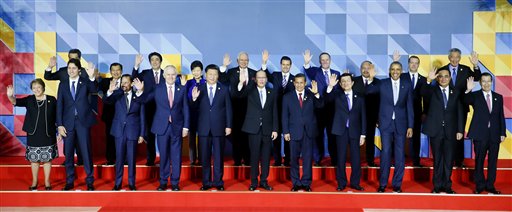Apec economies pledge to seal climate deal in Paris

Leaders wave as they pose for a group family photo at the Asia-Pacific Economic Cooperation (APEC) summit in Manila, Philippines, Thursday, Nov. 19, 2015. Pictured from top left, Hong Kong’s Chief Executive is Leung Chun-ying, Indonesian Vice President Jusuf Kalla, Japanese Prime Minister Shinzo Abe , South Korea President Park Geun-hye, Malaysian Prime Minister Najib Razak, Mexican President Enrique Pena Nieto, New Zealand Prime Minister John Key, Papua New Guinea Prime Minister Peter O’Neill, Prime Minister Dmitry Medvedev, Singapore Prime Minister Lee Hsien Loong. front row from left, Chile’s President Michelle Bachelet, Canadian Prime Minister Justin Trudeau, Sultan of Brunei Sultan Hassanal Bolkiah, Australian Prime Minister Malcolm Turnbull, Chinese President Xi Jinping, Philippines President Benigno Aquino III, Peru’s President Ollanta Humala, Vietnam’s President Truong Tan Sang, U.S. President Barack Obama, Thailand’s Prime Minister Prayut Chan-o-cha and Taiwan envoy Vincent Siew. (AP Photo/Bullit Marquez)
In what could be an encouraging foreshadowing, Pacific Rim nations—including the world’s top carbon emitters—have agreed to reach an ambitious but fair and durable climate agreement when world leaders meet in Paris in December.
In a Leaders Declaration at the culmination of the Asia-Pacific Economic Cooperation (Apec) summit in Manila on Thursday afternoon, 21 member economies, among them, heavy greenhouse gas emitters United States and China, agreed to take positive steps toward finally sealing the climate deal in France with a “fair, balanced, ambitious, durable and dynamic agreement on climate change” at the United Nations Climate Change Conference in Paris.
For one, the Apec leaders agreed to decrease the region’s aggregate energy intensity—or the amount of energy a nation needs to generate a unit of GDP (gross domestic product)—by 45 percent by 2035. Lower energy intensity implies a nation’s more efficient energy use.
The Apec economies also agreed to “double renewable energy in the regional energy mix by 2030 to achieve sustainable and resilient energy development within the Asia-Pacific.”
Threat to production
Article continues after this advertisementMaking the agreement in the Philippines, one of the world’s most climate-vulnerable nations, the Declaration’s Item No. 4—Building Sustainable and Resilient Communities—recognized how the “new normal, a time of increasing and intensifying natural disasters,” posed a threat to the region’s production and supply chains.
Article continues after this advertisementAs Canadian Prime Minister Justin Trudeau said in his concluding press conference in Manila on Thursday night: “Climate change is an urgent pressing reality that we need to address as a world.”
“I was glad to highlight that our part includes putting pressure and encourage other countries to step up and ensure that the outcome of Paris is ambitious and as optimistic as it is going to be,” Trudeau said.
While the bloc’s declaration’s are nonbinding, Apec leaders agreed to cut down on government subsidies for fossil fuels, which is known to “encourage wasteful consumption.”
Global consumer subsidies for fossil fuel is estimated to cost $600 billion a year, according to the Global Subsidies Initiative.
Disaster-resilient
In the declaration, Apec economies also agreed to operationalize the Apec Disaster Risk Reduction Framework (DRR) “to facilitate collective work in building adaptive and disaster-resilient economies supporting inclusive and sustainable development in the face of the new normal.”
“Through the Apec DRR Framework, we will minimize the losses we endure and ensure that our communities have the support to overcome adversity and build back better,” read the declaration.
In his concluding statement at the close of the Manila summit, President Aquino said the Apec DRR “aims to minimize losses and promote best practices so that we could build back better.”